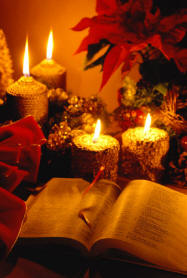 Christmas Christmas
Christmas is a Christian holy day that marks the birth of Jesus, the
son of God. However it is not only a Christian festival. Christmas has
roots in the Jewish holiday of Hanukkah, the festivals of the ancient
Greeks, the beliefs of the Druids and the folk customs of Europe.
Midwinter celebrations
Christmas comes just after the middle of winter. The sun is
strengthening and the days are beginning to grow longer. For people
throughout history this has been a time of feasting and celebration.
Ancient people were hunters and spent most of their time outdoors. The
seasons and weather played a very important part in their lives and
because of this they had a great reverence for, and even worshipped
the sun. The Norsemen of Northern Europe saw the sun as a wheel that
changed the seasons. It was from the word for this wheel, houl, that
the word yule (another name for Christmas) is thought to have come. At
the winter solstice the Norsemen lit bonfires, told stories and drank
sweet ale.
The ancient Greeks also held a festival to celebrate the rebirth of
the year. Saturnalia ran for seven days from the 17th of December. It
was a time when the ordinary rules were turned upside down. Men
dressed as women and masters dressed as servants. The festival also
involved decorating houses with greenery, lighting candles,
processions and giving presents.
Before Christianity came to the British Isles the Winter Solstice was
held on the shortest day of the year (21st December). The Druids
(Celtic priests) would cut the mistletoe that grew on the oak tree and
give it as a blessing. Oaks were seen as sacred and the winter fruit
of the mistletoe was a symbol of life in the dark winter months.
Judaism was the main religion of Israel at the time of Jesus' birth.
The Jewish mid-winter festival of Hanukkah marks an important part of
Jewish history. It is eight days long and on each day a candle is lit.
It is a time of remembrance, celebration of light and time to give
gifts and have fun.
| 